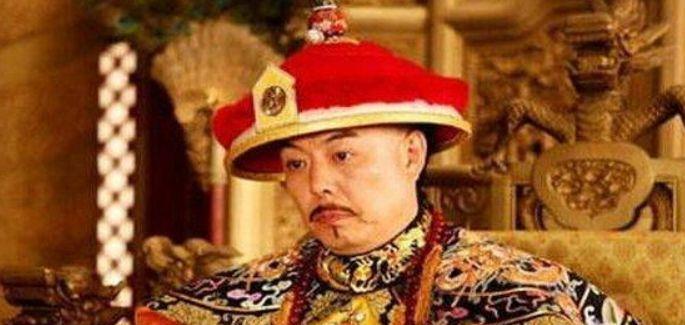At the age of 13, Ai Xinjueluo was secretly made crown prince by the Qianlong Emperor, and at the age of 36, he ascended to the throne of the Emperor by the Qianlong Emperor, becoming the fifth emperor after the Entry of the Qing Dynasty. The Jiaqing Emperor reigned for 25 years, although it was not a long time, but during his reign, the Qing Dynasty quickly declined.
Why would the Little Buddha say that Jiaqing's rule caused the Qing Dynasty to decline rapidly? Jiaqing is preceded by "Kangqian Shengshi", followed by the "Opium War", if the Qing Dynasty is compared to a person, then the qianlong period is a problem with several organs of the human body, but in the late Jiaqing period is the failure of multiple organs throughout the body.

Why did the Qing Dynasty decline rapidly at the hands of Jiaqing? From the few things he did, you can see why.
Jiaqing was not unsupportive, not frugal, not unkind, but too much to abide by the rules left by his ancestors, he obviously saw that the regime had problems with corruption, financial problems, etc., but the way to solve the problem was based on the records left by the previous emperors. In order to learn the way of the ancestors to govern the country, the first thing the Jiaqing Emperor did after getting up early every day to clean up was to sit in front of the desk and "read the First Dynasty Record of the Records of the First Dynasty, except for the hunting fasting, every day, cold and summer."
During Jiaqing's reign, he tried the New Deal, but he could not withdraw from the history of the Scriptures and firmly recorded the failed New Deal of the Song and Ming Dynasties: as long as the New Deal was a little negligent, the great result was that not only did it not solve the problem, but deepened the class contradictions and accelerated the overthrow of the dynasty. As the emperor of Shoucheng, Jiaqing was unwilling to bear the insults of his descendants (the result was still given to him), so he was resistant to the New Deal in his heart, and although he was trying the New Deal, he did not let anyone call it the New Deal, but only said that he was changing his father's mistakes in his later years and returning to the policies of his father's early years of rule. In fact, Jiaqing's bones are afraid that people will say that he is not filial piety and that he has deviated from his father's path of governance.
Although there are many conservative factions in the court, there are also many people who support Jiaqing's new policy, and some people point out that the root cause of the problem is actually in Qianlong, which undoubtedly touched Jiaqing's anti-scales and directly sent this official to Xinjiang. Then, Jiaqing began to self-reflect, believing that it was wrong for him to correct his father's mistakes, and that it was his new policy that made the courtiers disrespect their father. As a result of the reflection, Jiaqing determined the policy of his own governance: "Shoucheng" (to maintain the achievements and achievements created by his predecessors) and "Fazu" (to imitate the ancestors). When Jiaqing decided on this policy, no matter how hard he worked, the Qing Dynasty would rapidly decline during his reign.
In the early days of Jiaqing's pro-government, the people all believed that this emperor was the vanguard of the anti-corruption campaign, after all, he killed the qianlong dynasty's largest corrupt official, He Yan, and replaced more than half of the governors of the country, and at the same time, in order to cooperate with the suppression of the White Lotus Sect uprising (the Jiaqing Emperor himself concluded that the White Lotus Sect Uprising was actually an uprising of officials forcing the people to rebel), Jiaqing vigorously replaced corrupt officials and rectified the rule of officials. During that period, corrupt officials did relent, but unfortunately, Jiaqing's anti-corruption campaign did not persist throughout the entire period of administration, and for the officialdom, it was just a wind.
After the wind blew, officials in various places continued to be greedy and continued to loot the people's fat and people's ointment, and all this was actually related to Jiaqing's behavior.
Ten years after Jiaqing, the deceased Datong general Encheng'a embezzled a large amount of military salaries and was stabbed in Jiaqing's ear, "The late Datong town chief soldier Encheng'a and the late release of soldiers Ding Ma Qianyin committed suicide in fear of crimes." And such corrupt officials, who were also working in Shanxi, not only did not expose it, but also repeatedly played secret songs to the Jiaqing Emperor: "(Datong general soldier Encheng'a) is an old man with good conduct, is impartial, and can really straighten out the camp." Jiaqing sighed a lot, and he also knew that the Inspector of Shanxi must have received a lot of benefits and dealt with the Inspector, but he did not pursue other people who embezzled military salaries on a large scale, and for this reason, Jiaqing even gave a reason: "It is inevitable that such encroachments and deductions will be avoided in the provincial battalions." But he did not care for himself, and at this time he refused to investigate one after another." The emperor was unwilling to investigate thoroughly, and everyone continued to be greedy.
References: Draft History of the Qing Dynasty, Records of the Jiaqing Dynasty